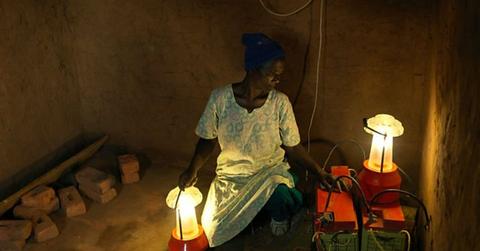
Photo Cred: VSO/ Peter Caton
Solar Mamas Bring Energy to Villages in Malawi
By Jamie RolloJune 7 2019, Published 9:11 p.m. ET
In Malawi, a small, landlocked nation in Southeast Asia, electricity is hard to come by. Eight solar mamas are on a mission to change that. With 53 percent of the country living below the poverty line, only 10 percent of the citizens are connected to an unreliable power grid, with only six to 10 hours of electricity a day, and outages lasting up to three days.
The government has attempted to connect schools and hospitals to the grid, but the plans were never followed through. Without power, students can only attend school during the day, and hospitals are left without live saving equipment that requires 24 hour electricity.
These eight women, however, are destined to change that. With only primary level education, these “solar mamas” studied hard to become solar engineers and are now bringing solar energy to the places that need it most. Funded by Voluntary Service Overseas, these women were able to go to India to learn valuable information in order to bring electricity to their home country.
These “solar mamas” were able to bring solar power to eight villages outside Lilongwe, the nation’s capital. The new technology is helping improve the lives of many in different facets of their lives, while also being environmentally sustainable.
Being a landlocked country, water is clearly hard to come by. However, the new solar panels allow farmers to pump groundwater and now they can water their farms twice a day, and even have some left over for storage.
The new solar power technology has made education even more accessible. “We have evening classes, thanks to the solar mamas, which are complementing government efforts,” Chrissy Bondo, Malawi Primary Education Advisor, told Anadolu Agency. “Children are now able to hold iPads and learn things we never had the chance to learn. Instructions are coming from the teachers on the iPads and it is exciting for students.”
The new energy source even reduced indoor air pollution, and created jobs such as running internet cafes, barber shops, and other things. Additionally, the country sees 3,000 hours of sunshine per year, so there should be no shortage of power.

